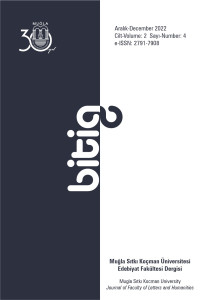Öz
Might it be the case that we are all glamorized by The Birth of Tragedy? Is it hiding the truth from us? How are we going to test the claims of someone who overwhelmes us with such a poetic style? Is Nietzsche a 'sophist'? Is this nomenclature, which Schopenhauer considers appropriate for Hegel and the Hegelians, an injustice to Nietzsche? Nietzsche represents the future, and he is a sacred for the unorthodox views. He is neither a nihilist nor an irrationalist; rather he is the harbinger of an empty and irrational world. A 'seer' who manifests himself where a unique power of understanding fuses with poetic competence. An overview of his philosophy necessitates an acknowledgement of his genius. However this work is about his first book. It's about a polemic that arose around this book. The Birth of Tragedy paved the way that ended his academic career as a philologist. Because as claimed by one of the greatest philologists of the nineteenth century, this book is unproffesional. Even, he maintains the author of this book is an ignorant charlatan. For some others, this book is dead in a scientific manner. These are some of the claims that put forward by great philologists. How should we evaluate these claims? Can we properly read The Birth of Tragedy without coming to terms with their claims? What is the significance of this book for the history of philosophy? If indeed it is counted as a book of a philosopher, or should we consider it as a work of a philologist? How can we ignore the critiques in this case? If there is some truth in these critiques, wouldn't it also apply to the style we encounter throughout Nietzsche's philosophy? In this work, I discuss what The Birth of Tragedy makes me think around such questions.
Anahtar Kelimeler
The Birth of Tragedy Dionysus Apollo classical philology style Wilamowitz-Moellendorff Schopenhauer
Kaynakça
- Arrowsmith, William (1963), “On Classics and Classicists (Part II)”. Arion: A Journal of Humanities and the Classics, Vol. 2, No. 2 (Summer), pp. 5-27.
- Groth, J. H. (1950), “Wilamowitz-Möllendorf on Nietzsche's Birth of Tragedy”. Journal of the History of Ideas, Vol. 11, No. 2 (Apr.), pp. 179-190.
- Murray, Gilbert (1954), “Memories of Wilamowitz”, Antike und Abendland 4, Vol. 4, No. 1, pp. 9-14.
- Nietzsche, Friedrich (1988), Kritische Studienausgabe (KSA) I: Die Geburt der Tragödie, Unzeitgemäße Betrachtungen I-IV, Nachgelassene Schriften 1870-1873. Herausgegeben von Giorgio Colli und Mazzino Montinari. Berlin/New York: Walter de Gruyter.
- Porter, James I (2011), “‘Don't Quote Me on That!’: Wilamowitz Contra Nietzsche in 1872 and 1873”. Journal of Nietzsche Studies, Vol. 42, No. 1, Special Issue Nietzsche's Ancient History (Autumn), pp. 73-99.
- Whitman, James (1986), “Nietzsche in the Magisterial Tradition of German Classical Philology”. Journal of the History of Ideas, Vol. 47, No. 3 (Jul. - Sep.), pp. 453-468.
- Wilamowitz-Moellendorff, Ulrich von (1872), Zukunftsphilologie! Eine Erwidrung auf Friedrich Nietzsches “geburt der tragödie”, Berlin: Gebrüder Borntraeger.
- Wilamowitz-Moellendorff, Ulrich von (1998). Geschichte der Philologie, Berlin, New York: B. G. Teubner. (Bu çalışma ilk kez 1921’de yayımlanmıştır.)
Öz
Bu çalışma, Tragedyanın Doğuşu hakkında geçmişte yaşanmış bir polemiği konu ediyor. Onu burada hatırlayınca, Nietzsche’nin poetik stilinin adeta uyuşturucu etkisi yapıp yapmadığını sormak gerekir. Nietzsche geleceği temsil eder, gelenek karşıtlarının kutsalıdır. Ne nihilisttir, ne de irrasyonalist; aksine boş ve irrasyonel dünyanın habercisidir. Benzersiz bir kavrayış gücünün poetik yetiyle kaynaştığı yerde kendini dışavuran bir ‘kâhin’. Onun felsefesine genel bir bakış, dehasını teslim etmeyi gerektirir. Ancak bu çalışma onun ilk kitabı hakkında. Bu kitap etrafında ortaya çıkan bir polemik hakkında. Tragedyanın Doğuşu, Nietzsche’nin bir filolog olarak akademik kariyerini sonlandıran yolu açmıştır. Çünkü ondokuzuncu yüzyılın en büyük filologlarından biri tarafından, bu kitabın meslek ahlakına uygun olmadığı iddia edilmektedir. Hatta onun yazarı bilgisiz bir şarlatandır. Bir başkası onun bilimsel olarak ölü olduğunu ileri sürmektedir. Bunları ileri sürenler tüm zamanların en büyük filologlarıdır. Şimdi bu iddiaları nasıl anlamalıyız? Onlarla hesaplaşmadan Tragedyanın Doğuşu okunabilir mi? Bu kitabın felsefe tarihi için önemi nedir? Elbette o, bir filozofun eseriyse! Yoksa onun bir filologun eseri olduğunu mu düşünmeliyiz? Bu durumda yöneltilen eleştirileri nasıl görmezden geleceğiz? Eğer bu eleştirilerde bir haklılık payı varsa, o Nietzsche’nin felsefesinin bütününde karşımıza çıkan stil için de geçerli olmaz mı? Eğer öyleyse, Schopenhauer’ın Hegel’e ve Hegelcilere ‘sofist’ yakıştırması, Nietzsche’ye de uygun düşmez mi? Yoksa bu büyük bir hata mıdır? Çalışmamda bu türden sorular etrafında Tragedyanın Doğuşu’nun bana düşündürdüklerini ele alıyorum.
Anahtar Kelimeler
Tragedyanın Doğuşu Wilamowitz-Moellendorff Dionysos Apollon Schopenhauer klasik filoloji stil sorunu
Kaynakça
- Arrowsmith, William (1963), “On Classics and Classicists (Part II)”. Arion: A Journal of Humanities and the Classics, Vol. 2, No. 2 (Summer), pp. 5-27.
- Groth, J. H. (1950), “Wilamowitz-Möllendorf on Nietzsche's Birth of Tragedy”. Journal of the History of Ideas, Vol. 11, No. 2 (Apr.), pp. 179-190.
- Murray, Gilbert (1954), “Memories of Wilamowitz”, Antike und Abendland 4, Vol. 4, No. 1, pp. 9-14.
- Nietzsche, Friedrich (1988), Kritische Studienausgabe (KSA) I: Die Geburt der Tragödie, Unzeitgemäße Betrachtungen I-IV, Nachgelassene Schriften 1870-1873. Herausgegeben von Giorgio Colli und Mazzino Montinari. Berlin/New York: Walter de Gruyter.
- Porter, James I (2011), “‘Don't Quote Me on That!’: Wilamowitz Contra Nietzsche in 1872 and 1873”. Journal of Nietzsche Studies, Vol. 42, No. 1, Special Issue Nietzsche's Ancient History (Autumn), pp. 73-99.
- Whitman, James (1986), “Nietzsche in the Magisterial Tradition of German Classical Philology”. Journal of the History of Ideas, Vol. 47, No. 3 (Jul. - Sep.), pp. 453-468.
- Wilamowitz-Moellendorff, Ulrich von (1872), Zukunftsphilologie! Eine Erwidrung auf Friedrich Nietzsches “geburt der tragödie”, Berlin: Gebrüder Borntraeger.
- Wilamowitz-Moellendorff, Ulrich von (1998). Geschichte der Philologie, Berlin, New York: B. G. Teubner. (Bu çalışma ilk kez 1921’de yayımlanmıştır.)
Ayrıntılar
| Birincil Dil | Türkçe |
|---|---|
| Bölüm | Araştırma Makaleleri |
| Yazarlar | |
| Yayımlanma Tarihi | 30 Aralık 2022 |
| Gönderilme Tarihi | 29 Kasım 2022 |
| Yayımlandığı Sayı | Yıl 2022 Cilt: 2 Sayı: 4 |
Kaynak Göster
 Creative Commons Atıf-GayriTicari-AynıLisanslaPaylaş 4.0 Uluslararası Lisansı ile lisanslanmıştır.
Creative Commons Atıf-GayriTicari-AynıLisanslaPaylaş 4.0 Uluslararası Lisansı ile lisanslanmıştır. 

